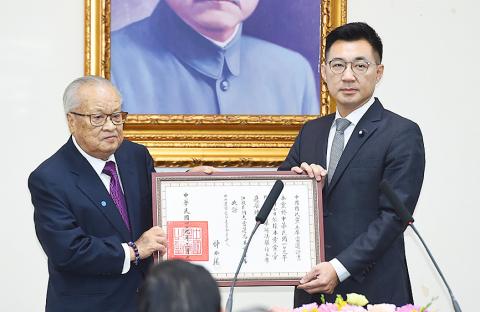Chinese Nationalist Party (KMT) Legislator Johnny Chiang (江啟臣) pledged urgent reforms as he was sworn in as the party’s new chairman yesterday.
“The end of the by-election is the beginning of unity,” Chiang said at his swearing-in at KMT headquarters in Taipei, which was attended by former president Ma Ying-jeou (馬英九), and former party chairmen Wu Poh-hsiung (吳伯雄) and Wu Den-yih (吳敦義), among others.
Saturday’s by-election was held to fill the vacancy left by Wu, who stepped down last month after the party’s losses in the Jan. 11 presidential and legislative elections.

Photo: Liao Chen-huei, Taipei Times
Chiang defeated his sole opponent, former Taipei mayor Hau Lung-bin (郝龍斌), by taking nearly 69 percent of the vote.
“I have always believed that what is needed between generations is dialogue and not confrontation; what is needed is cooperation and not conflict,” Chiang said, adding that as party chairman, he hopes to facilitate understanding and cooperation among different generations within the party.
The KMT’s defeats in the presidential elections in 2016 and this year “highlight that the party is behind the times in many aspects and urgently needs to catch up through reform and innovation,” he said. “We do not have any time to waste.”
“In an age of democracy, the KMT can no longer expect a wise leader to make all the decisions,” he said, adding that he would promote a collective leadership.
Chiang has proposed the creation of an 11-member “decisionmaking platform” within the party that he says would advise the chairperson and assist them in the decisionmaking process by presenting a diverse range of views.
Speaking on cross-strait policy, Chiang said: “My basic principle is to stick to the values of the Republic of China’s free and democratic system and strive for cross-strait peace and common well-being.”
While trust needed to be “rebuilt” between Taiwan and China, the KMT’s most important task at the moment is its own reform and transformation, Chiang said.
KMT Central Standing Committee member Lin Rong-te (林榮德), who served as acting chairman after Wu stepped down in January, said that the coming year would be key in determining whether the KMT can return to power.
Wu Poh-hsiung said that he “dare not say ‘congratulations’” to Chiang, given the task that lies ahead.
“This is not the attainment of power and status, but rather dedication and sacrifice for a difficult job,” he said.
Ma, who is also a former KMT chairman, said while he agrees that the party should first focus on reform, its position on Taiwan’s relationship with the world and with China should also be priorities.
Taiwan should have “close relations” with the US, “peaceful relations” with China and “friendly relations” with Japan, he said.
Chiang, 48, is a US-educated politician who entered politics in 2010 when he was appointed minister of the Executive Yuan’s now-defunct Government Information Office.
He has won a legislative seat in Taichung’s eighth electoral district for three consecutive elections beginning in 2012 and received more votes that any other KMT candidate in the Jan. 11 legislative election.
Additional reporting by CNA

Chinese Nationalist Party (KMT) Chairman Eric Chu (朱立倫), spokeswoman Yang Chih-yu (楊智伃) and Legislator Hsieh Lung-chieh (謝龍介) would be summoned by police for questioning for leading an illegal assembly on Thursday evening last week, Minister of the Interior Liu Shyh-fang (劉世芳) said today. The three KMT officials led an assembly outside the Taipei City Prosecutors’ Office, a restricted area where public assembly is not allowed, protesting the questioning of several KMT staff and searches of KMT headquarters and offices in a recall petition forgery case. Chu, Yang and Hsieh are all suspected of contravening the Assembly and Parade Act (集會遊行法) by holding

PRAISE: Japanese visitor Takashi Kubota said the Taiwanese temple architecture images showcased in the AI Art Gallery were the most impressive displays he saw Taiwan does not have an official pavilion at the World Expo in Osaka, Japan, because of its diplomatic predicament, but the government-backed Tech World pavilion is drawing interest with its unique recreations of works by Taiwanese artists. The pavilion features an artificial intelligence (AI)-based art gallery showcasing works of famous Taiwanese artists from the Japanese colonial period using innovative technologies. Among its main simulated displays are Eastern gouache paintings by Chen Chin (陳進), Lin Yu-shan (林玉山) and Kuo Hsueh-hu (郭雪湖), who were the three young Taiwanese painters selected for the East Asian Painting exhibition in 1927. Gouache is a water-based

Taiwan would welcome the return of Honduras as a diplomatic ally if its next president decides to make such a move, Minister of Foreign Affairs Lin Chia-lung (林佳龍) said yesterday. “Of course, we would welcome Honduras if they want to restore diplomatic ties with Taiwan after their elections,” Lin said at a meeting of the legislature’s Foreign Affairs and National Defense Committee, when asked to comment on statements made by two of the three Honduran presidential candidates during the presidential campaign in the Central American country. Taiwan is paying close attention to the region as a whole in the wake of a

OFF-TARGET: More than 30,000 participants were expected to take part in the Games next month, but only 6,550 foreign and 19,400 Taiwanese athletes have registered Taipei city councilors yesterday blasted the organizers of next month’s World Masters Games over sudden timetable and venue changes, which they said have caused thousands of participants to back out of the international sporting event, among other organizational issues. They also cited visa delays and political interference by China as reasons many foreign athletes are requesting refunds for the event, to be held from May 17 to 30. Jointly organized by the Taipei and New Taipei City governments, the games have been rocked by numerous controversies since preparations began in 2020. Taipei City Councilor Lin Yen-feng (林延鳳) said yesterday that new measures by